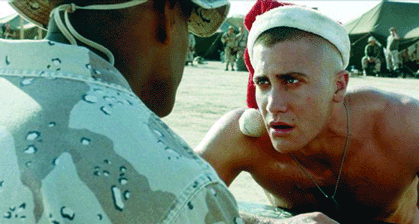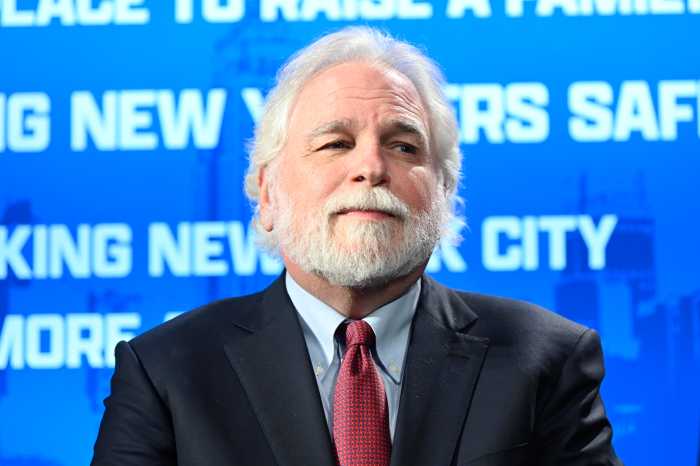Would-be satire founders in shallow cynicism, glorifying aggression
Adapted from the 1991 Persian Gulf War memoir by former Marine Lance Corporal Anthony Swofford, “Jarhead” is a prestige package that opens just as U.S. military casualties in Gulf War II breach the 2,000 mark, a timely reminder of those who’ll never be home again for the holidays.
Universal’s $60 million risk with this ostensibly dicey material is buffered by a slew of Oscar recipients—director Sam Mendes, editor Walter Murch, supporting players Jamie Foxx and Chris Cooper—and nominees like composer Thomas Newman and cinematographer Roger Deakins.
Screenwriter William Broyles Jr., himself a Vietnam-era marine with a son in the Air Force in Iraq, fillets a streamlined narrative from the picaresque memoir. Swofford’s withering tone has been shucked, however, along with his Marine-family history and wrenching civilian readjustment, in favor of a lightly pessimistic but ultimately full-throated panegyric to the culture, if not the aims, of US military aggression.
Starting at Camp Pendleton in 1989, 17-year-old enlistee “Swoff” (a shorn, beefed-up Jake Gyllenhaal) is quickly getting the brutal gist of military life. When he retorts to a superior, “I got lost on my way to college, sir!” the officer rams the kid’s skull against a blackboard, at which moment Mendes and Murch hit a freeze-frame, establishing the kind of bombast that only ratchets up across the film’s length.
Swoff enters the barracks just as a barking knot of men have subdued another. Rolling up his trouser leg, they apply a smoking metal brand to his shin: USMC. While “Don’t Worry, Be Happy” burbles on the soundtrack, Swoff is tackled by his new mates, his wrists taped to the cot rails as a sadistic grunt wields the blowtorch-fired brand over his flesh. Swoff passes out, then wakes to find himself alone with the taciturn Troy (Peter Sarsgaard), his leg unmarked. Troy explains, “You want a brand, you gotta earn it.”
A fleet interlude hints at Swofford’s joyless family background, and deposits us in basic training under the tutelage of Staff Sergeant Sykes (the excellent Foxx). One high-strung private freaks while crawling under a barbed-wire trellis, and, rising to his knees, takes a live round—that Sykes uses for drills—right in the cranium, inches from the petrified Swoff, another layer of his innocence seared away. Through seductively staged training rituals, Swoff’s ingenuous distress anneals into primal bloodlust, given focus by his selection for coveted scout-sniper duty. “I wanted the pink mist,” he purrs during target practice, as the camera stares through the gunsights.
Then they are called up. A graphic-match cut jumps from an auditorium where the jarheads are screening “Apocalypse Now” to an airplane cabin interior, delivering the company to a base near Riyadh—actually shot in southern California’s appropriately named Imperial Valley. The visual palette suddenly bleaches, forcing attention to Deakins’ cinematography, digitally processed as in his work for the Coen brothers to render some strikingly artificial effects.
Amid the desert ennui and testosterone-soaked tumult of base camp, paranoia about straying sweethearts takes root. A letter from Swoff’s girlfriend mentioning a new pal sets him spiraling into a dream sequence, beholding her image where his reflection should be in a latrine mirror, then vomiting a grayish geyser. His neuroses are echoed when another grunt gets a videotape from his lady, with what looks like a dub of “The Deer Hunter” but turns out to feature camcorder footage of her fornicating doggy style with a neighbor—her payback for his own infidelity.
During a Christmas party where Swoff cavorts naked but for a Santa’s cap on his head and another strapped over his basket, the nebbishy grunt Fergus causes an accidental fire. Occurring on Swoff’s watch, he is demoted to private and put on outhouse duty, provoking a face-off between Swoff and Fergus obviously meant as an award-fetching showstopper. But as in Mendes’ “American Beauty,” the actors’ hoarse hyperventilating only magnifies the jejune self-aggrandizement everywhere on display.
When the troops are finally deployed to Kuwait, things turn expressionistic, with widescreen nocturnal tableaux of men silhouetted against burning oil wells, and a stray white steed painted black by the raining petroleum. As ever, Mendes’ instinct for bathos is infallible––moist-eyed, Gyllenhaal strokes the whimpering animal’s jaw and murmurs, “I’m sorry.” Then Swoff and Sykes take five for some overdue bonding, trading jarhead wisdom while surveying the flaming sands.
“Jarhead” would have us believe that its soupçon of pessimism, cartoonish frat-house impudence, and potty-mouthed dialogue are somehow transgressive. Yet the genuine critique inscribed in Swofford’s memoir is diluted to a callow nihilism, imbibed as easily as it is forgotten, that leaves intact the pretexts for American invasion and simply ignores its real-world implications and consequences.
Indeed, it appears Mendes and company accept as valid the administration’s imperialist logic. Speaking to the Los Angeles Times in September, Mendes pondered rhetorically, “Were these grunts the victims or the aggressors?”—a question one wishes were put instead to an Iraqi civilian—while the lads line up to wave the flag. “I’m in awe of what [Marines] do,” Gyllenhaal gushed, “choosing to go to Iraq and give their lives.”
Sarsgaard hits the hardest note, nixing the imputation of an anti-war stance by declaring, “There aren’t many pro-war movies,” and adding, “What we feel in our dreams is… a lot more important than what we think about our country in our conscious minds.” In other words, don’t sweat our elected leaders’ systematic deceptions, the fabricated “evidence” of WMDs, the coercion of consent, the massive human slaughter, and ongoing pillage. Freedom is on the march!
“Jarhead” also suffers redundancy with “Occupation: Dreamland,” the recent embedded documentary shot with Marines deployed in Fallujah, covering similar ground at far less historical and moral remove. But whereas “Occupation: Dreamland” distributes its point-of-view evenly among the soldiers, and crucially gives voice to the subjugated Iraqis, “Jarhead” never leaves Swofford’s perspective. The Iraqis are portrayed as either mirage-like Bedouins traversing the desert or ashen corpses in a bombed caravan.
“Jarhead” claims to speak for the lowly serviceman but its sugared images and puerile posturing falsify what war correspondent Chris Hedges has called “the sickness and perversion of the battlefield.” Swofford’s angst at never getting to fire his rifle once on duty seems trivial indeed against fresh reports of officially authorized U.S. torture in Iraq, now confirmed to be even more widespread than previously acknowledged.
These colors aren’t fun. Save your valuable movie time instead for the CinemaEast Film Festival of Middle Eastern cinemas, opening with perfect synchronicity also on Friday. Any of the CinemaEast selections is more honestly illuminating than a dozen “Jarheads.”
gaycitynews.com




































